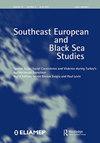The populist framing of the Russia-Ukraine war by the Hungarian government: convergence or contestation in the EU
IF 1.2
2区 社会学
Q2 AREA STUDIES
引用次数: 0
Abstract
ABSTRACTThis study examines how the Hungarian government frames the Russia-Ukraine War within the context of its relations with the European Union (EU) using discourse historical strand of critical discourse analysis (CDA). This study will also answer how the Hungarian government presents its own policy choices as if the will of the people in its dealings with the EU. The study will conduct an extensive qualitative frame analysis of political discourses produced by Hungarian government officials. Through this analysis, the current study contributes to the literature empirically and advances the debates revolving around crises leading to contestation between the EU and its member states. The performed analysis demonstrates that the war is communicated mainly through the ‘Hungarian (government) lenses’ of national security concerns and national economic interests, both constructed upon nationalist sentiments coupled with populist overtones, leading Hungary to contest the EU’s decisions and norms.KEYWORDS: EUHungaryRussia-Ukraine warpopulismcritical discourse analysis AcknowledgegmentsWe are grateful to editors, Ioannis N. Grigoriadis and Ümit Erol Aras as well as the guest editors of the special issue, Ali Onur Özçelik, Kadri Kaan Renda and Anthony Costello for their unwavering support throughout the publication process. We also would like to thank anonymous reviewers and editors for their extensive comments and suggestions. An earlier version of this article was presented at the Jean Monnet Networking Project known as “Linking to Europe at the Periphery” (LEAP) Conference of ‘Contesting Europe at the Periphery’ (Eskişehir, 2022). We extend our gratitude to the discussants and participants of the conference for their feedback.Disclosure statementNo potential conflict of interest was reported by the author(s).Additional informationNotes on contributorsMelek Aylin ÖzofluMelek Aylin Özoflu is a PhD.Research Fellow at Özyeğin University, Department of International Relations in İstanbul, Türkiye. She also conducts post-doctoral research at ELTE University, Faculty of Law, Institute of Political Science in Budapest,Hungary. She earned her PhD in Political Science and International Relations from Corvinus University of Budapest, Hungary with summa cum laude distinction by defending her dissertation entitled “Discursive Construction of the European Identity in Germany during the Euro and Refugee Crises of the EU” in April 2023. She holds an MSc in European studies from the Middle East Technical University, Ankara Turkey. Her main research areas focus on critical discourse analysis, identity politics, European identity, European politics and EU crises.She has various articles published and in the press in these fields. Her recent publication “Construction of European Identity by the Pro-European Parties” has been published by the SSCI-indexed Journal of International Relations/vol. 19,no. 74.Krisztina AratóKrisztina Arató is a full professor and director at ELTE University, Faculty of Law, Institute of Political Science in Budapest, Hungary. She studied history at ELTE University in Budapest and political science at the Victoria University of Manchester, England. She wrote her Ph.D. dissertation on the social dialogue system of the EU at Corvinus University, Budapest. She was the president of the Hungarian Political Science Association 2015-2021. Her research interests are history and theories of European integration, and civil and social dialogue. She authored and edited textbooks about the European Union (The Voyage of Europe with Boglárka Koller, in Hungarian, the Political System of the European Union, co-edited with Boglárka Koller, both in Hungarian) and recently co-edited the volume, The Political Economy of the Eurozone in Central and Eastern Europe Why In, Why Out? (Routledge, 2021).匈牙利政府对俄乌战争的民粹主义框架:欧盟的趋同还是争论
摘要本文运用批评性话语分析(CDA)的话语历史线索,考察匈牙利政府如何在其与欧盟关系的背景下构建俄乌战争。这项研究还将回答匈牙利政府如何在与欧盟打交道时表现出自己的政策选择,就好像是人民的意愿一样。该研究将对匈牙利政府官员的政治话语进行广泛的定性框架分析。通过这一分析,本研究为实证文献做出了贡献,并推动了围绕危机的辩论,导致欧盟及其成员国之间的争论。进行的分析表明,战争主要是通过国家安全问题和国家经济利益的“匈牙利(政府)镜头”传播的,两者都建立在民族主义情绪和民粹主义色彩的基础上,导致匈牙利对欧盟的决定和规范提出质疑。感谢编辑Ioannis N. Grigoriadis和Ümit Erol Aras以及特刊特约编辑Ali Onur Özçelik、Kadri Kaan Renda和Anthony Costello在出版过程中给予的坚定支持。我们还要感谢匿名审稿人和编辑提供的大量意见和建议。本文的早期版本在Jean Monnet网络项目“连接外围欧洲”(LEAP)“边缘欧洲竞赛”会议(eski, 2022)上发表。我们对本次会议的讨论者和与会者提供的反馈表示感谢。披露声明作者未报告潜在的利益冲突。作者简介:melek Aylin ÖzofluMelek Aylin Özoflu博士。Özyeğin大学国际关系系研究员,İstanbul, rkiye。她还在匈牙利布达佩斯ELTE大学法律系政治科学研究所进行博士后研究。她于2023年4月以优异成绩获得匈牙利布达佩斯科维努斯大学政治学与国际关系博士学位,并为其题为“欧元与欧盟难民危机期间德国欧洲身份的话语建构”的论文进行了答辩。她拥有土耳其安卡拉中东技术大学欧洲研究硕士学位。主要研究领域为批评话语分析、认同政治、欧洲认同、欧洲政治和欧盟危机。她在这些领域发表了多篇文章。她最近发表的论文《亲欧政党对欧洲认同的建构》已在ssci索引的《国际关系杂志》(Journal of International Relations)上发表。19日,没有。74.Krisztina AratóKrisztina Arató是匈牙利布达佩斯ELTE大学法学院和政治科学研究所的正教授和主任。她在布达佩斯的ELTE大学学习历史,在英国曼彻斯特的维多利亚大学学习政治学。她在布达佩斯科维努斯大学撰写了关于欧盟社会对话系统的博士论文。2015-2021年,她担任匈牙利政治科学协会主席。她的研究兴趣是欧洲一体化的历史和理论,以及公民和社会对话。她撰写并编辑了有关欧盟的教科书(与Boglárka Koller合著的《欧洲之旅》,匈牙利语版;与Boglárka Koller合著的《欧盟政治制度》,匈牙利语版),最近还与人合编了《中东欧欧元区的政治经济:为什么加入,为什么退出?》(出版社,2021)。
本文章由计算机程序翻译,如有差异,请以英文原文为准。
求助全文
约1分钟内获得全文
求助全文
来源期刊

Southeast European and Black Sea Studies
AREA STUDIES-
CiteScore
3.00
自引率
19.00%
发文量
73
期刊介绍:
The aim of the journal is to establish a line of communication with these regions of Europe. Previously isolated from the European mainstream, the Balkan and Black Sea regions are in need of serious comparative study as are the individual countries, no longer "at the edge" of Europe. The principal disciplines covered by the journal are politics, political economy, international relations and modern history; other disciplinary approaches are accepted as appropriate. The journal will take both an academic and also a more practical policy-oriented approach and hopes to compensate for the serious information deficit on the countries under consideration.
 求助内容:
求助内容: 应助结果提醒方式:
应助结果提醒方式:


